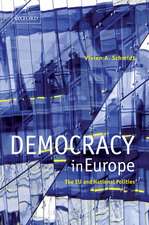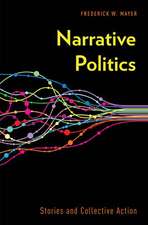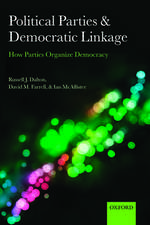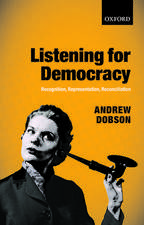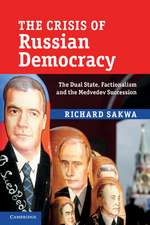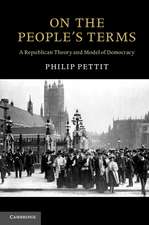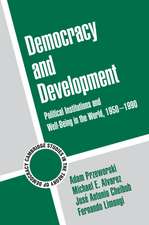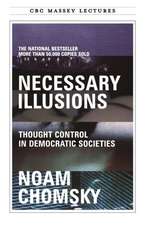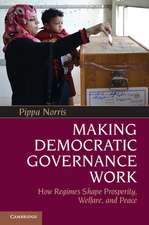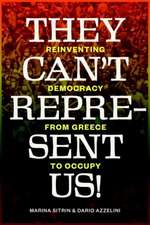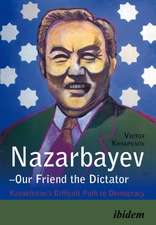Confucian Democracy in East Asia: Theory and Practice
Autor Sungmoon Kimen Limba Engleză Paperback – 23 feb 2014
| Toate formatele și edițiile | Preț | Express |
|---|---|---|
| Paperback (1) | 263.79 lei 6-8 săpt. | |
| Cambridge University Press – 23 feb 2014 | 263.79 lei 6-8 săpt. | |
| Hardback (1) | 662.43 lei 6-8 săpt. | |
| Cambridge University Press – 27 feb 2014 | 662.43 lei 6-8 săpt. |
Preț: 263.79 lei
Nou
Puncte Express: 396
Preț estimativ în valută:
50.49€ • 54.86$ • 42.44£
50.49€ • 54.86$ • 42.44£
Carte tipărită la comandă
Livrare economică 21 aprilie-05 mai
Preluare comenzi: 021 569.72.76
Specificații
ISBN-13: 9781107641211
ISBN-10: 1107641217
Pagini: 330
Dimensiuni: 152 x 228 x 18 mm
Greutate: 0.45 kg
Ediția:New.
Editura: Cambridge University Press
Colecția Cambridge University Press
Locul publicării:New York, United States
ISBN-10: 1107641217
Pagini: 330
Dimensiuni: 152 x 228 x 18 mm
Greutate: 0.45 kg
Ediția:New.
Editura: Cambridge University Press
Colecția Cambridge University Press
Locul publicării:New York, United States
Cuprins
Part I. Beyond Thick Confucian Communitarianism and Meritocratic Elitism: 1. The Confucian social self and its discontent; 2. Toward civil Confucianism; 3. Against meritocratic elitism; Part II. A Pluralist Reconstruction of Confucian Democracy: 4. Value pluralism and Confucian democratic civil society; 5. Confucian familialism and public reasoning; 6. In defense of Confucian democratic welfarism; 7. Rethinking political meritocracy: selection plus two; Part III. Paving an Exemplary Path: The Korean Case: 8. Motivating and legitimating Confucian democracy: the politics of Chŏng; 9. Public reason and the liberalism of human rights; 10. Confucian civility and expressive liberty; 11. Confucianizing multiculturalism.
Recenzii
'A remarkable study that raises the question: are Asian societies essentially autocratic or are they compatible with modern democracy? If the latter, how can their symbiosis be best understood? Rejecting the incompatibility thesis, the author calls into question presumed Asian preferences for thick communitarianism (neglectful of individual liberty and social pluralism) and public meritocracy (neglectful of popular accountability). Proceeding in a clear, analytical fashion, Kim defends the idea of a Confucian civil democracy whose institutions, supported by Confucian habits and mores, can provide a bulwark for public freedom, democratic citizenship, and good governance. This is an admirable vision designed to call forth the better angels of democracy.' Fred Dallmayr, University of Notre Dame and author of Dialogue among Civilizations
'Confucianism is neither ready-made for democracy nor inalterably opposed to it. As Sungmoon Kim shows in this important book, however, a Confucianism worth defending in the complex, multicultural East Asia of today both can and must incorporate a robust form of democracy. Kim deploys a wealth of careful arguments that draw from classical Confucianism, a wide range of Western political theorists, and the distinctive political culture of modern Korea. The result is a rich and provocative work that successfully bridges theory and practice. Anyone interested in the future possibilities for democracy and for Confucianism - whether conjoined or not - will have to take this book seriously.' Stephen C. Angle, Wesleyan University
'Sungmoon Kim's Confucian Democracy in East Asia is a deep, subtle, and beautifully written examination of two contested concepts, democracy and Confucianism. Kim's aim is to articulate a philosophically credible and politically realistic vision of what Confucian democracy can be in twenty-first-century East Asia. Besides succeeding at that task, Kim reminds us that there are many unexplored possibilities for aligning distinctive identity-conferring beliefs with democratic and liberal political ideals. A must-read for comparative philosophers and political theorists.' Owen Flanagan, Duke University
'Writing in a deep, subtle, and analytical manner, Kim aims to articulate a culturally relevant and politically effective model that is built on Confucian habits and mores and is supported by largely liberal-democratic political institutions … The volume is a must-read for those who are interested in future possibilities for democracy in East Asia.' Choice
'Sungmoon Kim's Confucian Democracy in East Asia: Theory and Practice is a brilliant and engaging contribution to our understanding of democratic theory and practice.' Jeffrey Flynn, Philosophy East and West
'Kim displays a vast and subtle knowledge of both Confucian and Western political theory … Kim is able to bring Western political theory and Confucianism into a rich dialogue and he takes up sophisticated and nuanced positions on many of the most important questions that arise in relation to definition of his core terms, such as 'democratization' and 'liberalism'.' Brian Esparza Walker, The Review of Politics
'[This book] moves the study of both Confucian political thought and comparative political theory towards a greater sensibility to, and engagement with, the actual contemporary political reality of the Asian, and more generally, the non-Western, world.' Loubna El Amine, Notre Dame Philosophical Reviews
'Kim's book is rich and provocative. He has made his arguments by drawing on and debating with different Western and Eastern Confucian scholars, ancient as well as contemporary. His theory attempts to avoid the problem of the emphasis on individualism in liberal democracy and the oppressive tendency of Confucian communitarianism.' Andrew T. W. Hung, European Political Science
'Confucianism is neither ready-made for democracy nor inalterably opposed to it. As Sungmoon Kim shows in this important book, however, a Confucianism worth defending in the complex, multicultural East Asia of today both can and must incorporate a robust form of democracy. Kim deploys a wealth of careful arguments that draw from classical Confucianism, a wide range of Western political theorists, and the distinctive political culture of modern Korea. The result is a rich and provocative work that successfully bridges theory and practice. Anyone interested in the future possibilities for democracy and for Confucianism - whether conjoined or not - will have to take this book seriously.' Stephen C. Angle, Wesleyan University
'Sungmoon Kim's Confucian Democracy in East Asia is a deep, subtle, and beautifully written examination of two contested concepts, democracy and Confucianism. Kim's aim is to articulate a philosophically credible and politically realistic vision of what Confucian democracy can be in twenty-first-century East Asia. Besides succeeding at that task, Kim reminds us that there are many unexplored possibilities for aligning distinctive identity-conferring beliefs with democratic and liberal political ideals. A must-read for comparative philosophers and political theorists.' Owen Flanagan, Duke University
'Writing in a deep, subtle, and analytical manner, Kim aims to articulate a culturally relevant and politically effective model that is built on Confucian habits and mores and is supported by largely liberal-democratic political institutions … The volume is a must-read for those who are interested in future possibilities for democracy in East Asia.' Choice
'Sungmoon Kim's Confucian Democracy in East Asia: Theory and Practice is a brilliant and engaging contribution to our understanding of democratic theory and practice.' Jeffrey Flynn, Philosophy East and West
'Kim displays a vast and subtle knowledge of both Confucian and Western political theory … Kim is able to bring Western political theory and Confucianism into a rich dialogue and he takes up sophisticated and nuanced positions on many of the most important questions that arise in relation to definition of his core terms, such as 'democratization' and 'liberalism'.' Brian Esparza Walker, The Review of Politics
'[This book] moves the study of both Confucian political thought and comparative political theory towards a greater sensibility to, and engagement with, the actual contemporary political reality of the Asian, and more generally, the non-Western, world.' Loubna El Amine, Notre Dame Philosophical Reviews
'Kim's book is rich and provocative. He has made his arguments by drawing on and debating with different Western and Eastern Confucian scholars, ancient as well as contemporary. His theory attempts to avoid the problem of the emphasis on individualism in liberal democracy and the oppressive tendency of Confucian communitarianism.' Andrew T. W. Hung, European Political Science
Descriere
Confucian Democracy in East Asia explores the unique Confucian reasoning that still exists in much of East Asian culture.

